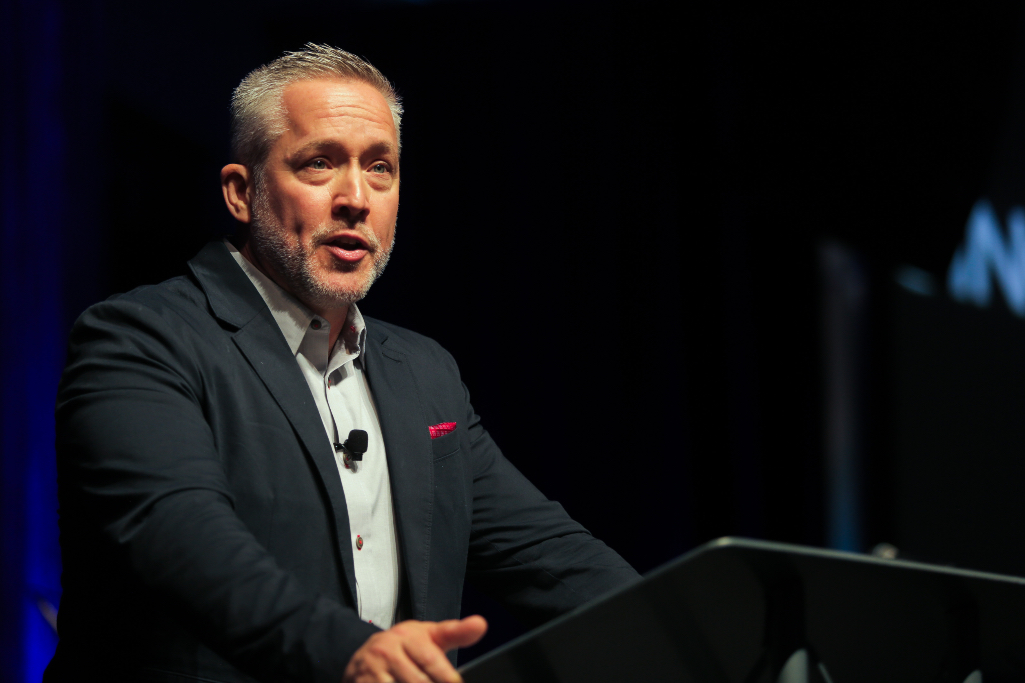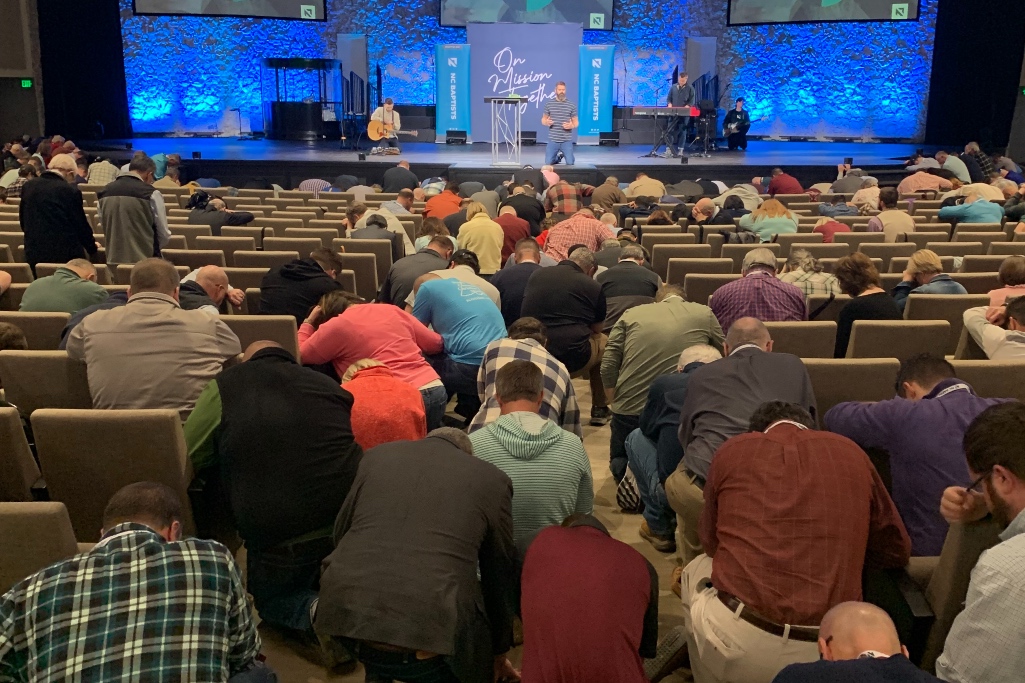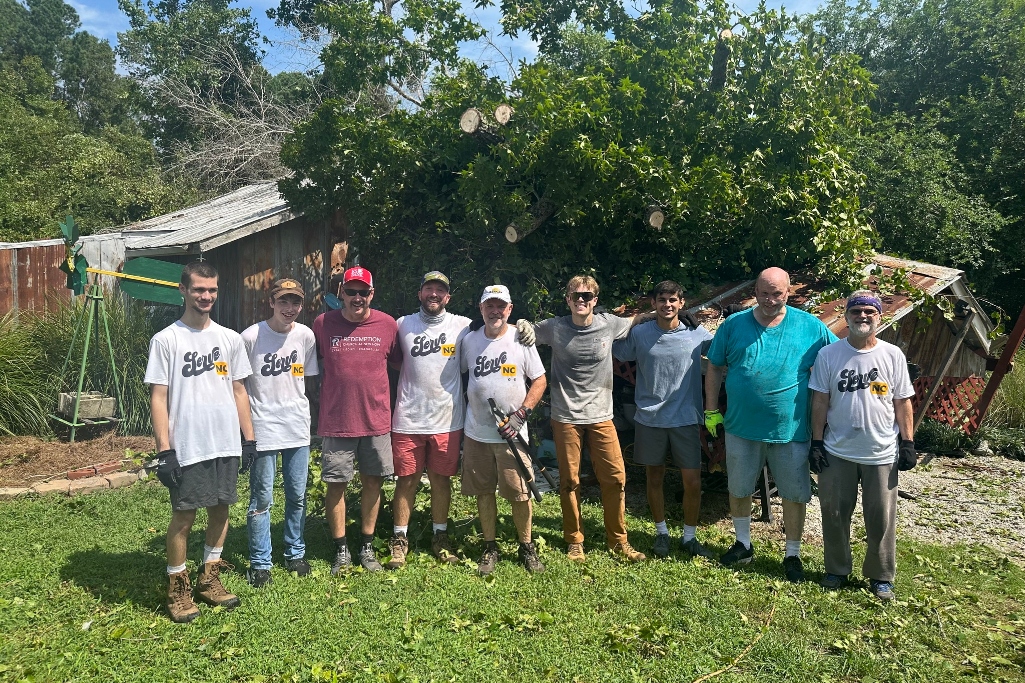
J.D. Greear, lead pastor of The Summit Church in Durham, N.C., preaches during the 2024 N.C. Baptist Pastors’ Conference.
GREENSBORO, N.C. — The 2024 N.C. Baptist Pastors’ Conference sought to bring together two ministry concepts that often seem at odds with one another in the local church — growing and going.
“We celebrate going, but we sort of talk about growing in hushed tones,” said conference President Andrew Hopper, lead pastor of Mercy Hill Baptist Church in Greensboro.
Speakers at the conference expounded upon various aspects of “Growing and Going,” which served as the theme for this year’s event. The conference took place Sunday and Monday, Nov. 3-4, at the Joseph S. Koury Convention Center prior to the N.C. Baptist annual meeting.
“Churches can grow without going, but they really can’t go without growing,” Hopper said at the outset of the conference.
Seven speakers delivered messages over the course of the two-day conference, which included a panel discussion around the conference theme. Speakers included: Jason Brinker, Jerry Lewis, Bryant Wright, Antoine Lassiter, J.D. Greear, Dean Inserra and Steven Wade. Panelists included: Skip Allen, Chris Justice and Spence Shelton.
Conference attendees also elected officers for the 2026 event. Josh Fraley, lead pastor of Euto Baptist Church in Marshville, N.C., was elected president. Brandon Mullis, pastor of Clear Creek Baptist Church in Charlotte, N.C., was elected vice president. Howard McNeill, senior pastor of Southside Baptist Church in Greensboro, N.C., was elected treasurer. All three candidates ran unopposed.
Pastors’ conference officers are typically elected two years in advance.
Following are summaries from the individual pastors’ conference messages.
Jason Brinker
Brinker, lead pastor of Catalyst Church in Jacksonville, N.C., shared four principles for building a healthy culture of baptism in the local church. They were: making the gospel and the call to baptism clear; building gospel confidence in people by preparing them to share their faith; setting faith-filled goals; and creating a culture of expectation and celebration.
Brinker said Catalyst Church has baptized nearly 5,000 people in the 16 years he’s served as pastor, which includes 450 in the past year. He encouraged pastors to lead their people to be desperate to bring people to Jesus, drawing from the account in Mark 2:1-12 in which four men broke through a roof in order to get a paralytic man to Jesus.
“People desperately need Jesus … and Jesus is desperate for people,” Brinker said.
Jerry Lewis
Lewis, lead pastor of Grace Community Church in Marion, N.C., preached from Titus 1 on the importance of faithfulness in difficult ministry contexts. Lewis drew modern parallels from Titus’ ministry among the people on the Greek island of Crete, who were described in Scripture as “empty talkers and deceivers” and “detestable, disobedient [and] unfit for any good work.”
“Do you believe God can save people like that?” Lewis asked. “In your community there are Cretans…. Who are they, and how are you doing to reach them?”
Bryant Wright
Wright, longtime pastor of Johnson Ferry Baptist Church in metro Atlanta and former president of the Southern Baptist Convention, preached on “Connecting the Church to God’s Global Mission.” In expounding upon the Great Commission in Matthew 28:16-20, Wright shared three keys that helped Johnson Ferry become what he called a “Great Commission congregation.”
Those keys included giving to missions, prayer, and sending and going.
“We are called to be sending churches where people are going to fulfill the Great Commission,” Wright said. “What’s going to be your role and your church’s role in giving, praying, and sending and going?”
Antoine Lassiter
Kicking off the Monday morning session, Lassiter, SendNC church planting strategist, preached on how the Lord is calling all churches to plant churches.
Through the account of Jesus calming the storm in Mark 4:35-41, Lassiter shared four key elements displayed in the story that today’s believers need to plant churches. They were: urgency to go to places that are “spiritually dry;” unity between believers; an unwavering commitment to trusting Jesus in the storm; and an understanding on unleashing the Spirit.
“The call to plant churches across North Carolina isn’t for one church alone, it is a mission for the entire body of Christ,” Lassiter said.
J.D. Greear
Greear, senior pastor of The Summit Church in Durham, N.C., used Matthew 28:19-20 to share why every church should strive to be a multiplying church and outlined five primary obstacles to becoming a multiplying church.
Those obstacles were: failing to really understand the Holy Spirit’s plan; failing to take Jesus’ promises about the Holy Spirit seriously; attempting to use a Christian-culture strategy to reach an increasingly post-Christian culture; ministry idolatry; and fear.
“God’s work done God’s way will never lack God’s supply,” Greear said.
Dean Inserra
Inserra, lead pastor of City Church in Tallahassee, Fla., preached on “mobilizing the mobile.” He warned against the dangers of overcorrecting in our faith and insulating from the world which keeps Christians from sharing the gospel with a culture in need of Christ.
Using the Great Commission in Matthew 28:19-20 to illustrate what it actually means to live like Jesus, Inserra pointed out that when believers are becoming more like Jesus they will not only have a knowledge of the Scriptures, but they will also see the ministry opportunities in their everyday lives.
“If our churches are going to grow, it’s because our people are going to see that the essential part of discipleship is following Jesus into the world,” Inserra said.
Steven Wade
Wade, lead pastor of Faith Baptist Church in Youngsville, N.C., said healthy churches that are growing and going must have a clear pathway to move people from crowd to family. Preaching from Acts 2, Wade said a church that leads people from crowd to family desperately depends upon the power of the Holy Spirit, boldly declares the Word of God and diligently devotes themselves to community.
“We are transformed by the Spirit of God through the Word of God in community with the people of God,” Wade said.


